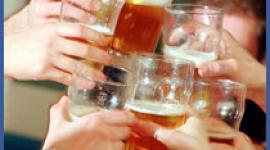Alcohol, Cocaine Relapse Prevention
Cognitive behavioral therapies help cocaine addicts and alcoholics incorporate relapse prevention techniques into their lives.
 Cognitive-behavioral therapy was developed for the treatment of problem drinking and adapted later for cocaine addicts. Cognitive-behavioral strategies are based on the theory that learning processes play a critical role in the development of maladaptive behavioral patterns. Individuals learn to identify and correct problematic behaviors. Relapse prevention encompasses several cognitive-behavioral strategies that facilitate abstinence as well as provide help for people who experience relapse.
Cognitive-behavioral therapy was developed for the treatment of problem drinking and adapted later for cocaine addicts. Cognitive-behavioral strategies are based on the theory that learning processes play a critical role in the development of maladaptive behavioral patterns. Individuals learn to identify and correct problematic behaviors. Relapse prevention encompasses several cognitive-behavioral strategies that facilitate abstinence as well as provide help for people who experience relapse.
The relapse prevention approach to the treatment of cocaine addiction consists of a collection of strategies intended to enhance self-control. Specific techniques include exploring the positive and negative consequences of continued use, self-monitoring to recognize drug cravings early on and to identify high-risk situations for cocaine use, and developing strategies for coping with and avoiding high-risk situations and the desire to use. A central element of this treatment is anticipating the problems patients are likely to meet and helping them develop effective coping strategies.
Research indicates that the skills individuals learn through relapse prevention therapy remain after the completion of treatment. In one study, most people receiving this cognitive-behavioral approach maintained the gains they made in treatment throughout the year following treatment.
References:
Carroll, K.; Rounsaville, B.; and Keller, D. Relapse prevention strategies for the treatment of cocaine abuse. American Journal of Drug and Alcohol Abuse 17(3): 249-265, 1991.
Carroll, K.; Rounsaville, B.; Nich, C.; Gordon, L.; Wirtz, P.; and Gawin, F. One-year follow-up of psychotherapy and pharmacotherapy for cocaine dependence: delayed emergence of psychotherapy effects. Archives of General Psychiatry 51: 989-997, 1994.
Marlatt, G. and Gordon, J.R., eds. Relapse Prevention: Maintenance Strategies in the Treatment of Addictive Behaviors. New York: Guilford Press, 1985.
Source: National Institute of Drug Abuse, "Principles of Drug Addiction Treatment: A Research Based Guide."
next: The Matrix Model
~ all articles on Principles of Drug Addiction Treatment
~ addictions library articles
~ all addictions articles
APA Reference
Staff, H.
(2009, January 1). Alcohol, Cocaine Relapse Prevention, HealthyPlace. Retrieved
on 2026, March 1 from https://www.healthyplace.com/addictions/articles/alcohol-cocaine-relapse-prevention



